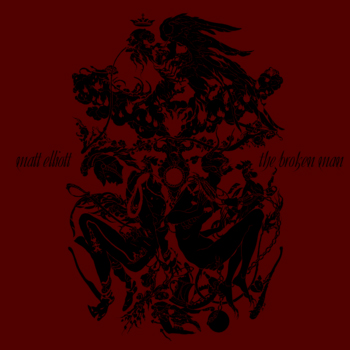Matt Elliott’s early solo releases as The Third Eye Foundation, which mixed complex drum & bass syncopation with a bereft ambience, sounded deadly serious, but frequently acquired a dimension of mordant humour by way of titles such as ‘I’m Sick and Tired of Being Sick and Tired’ and ‘There’s a Fight at the End of the Tunnel’. This was an interesting giveaway. Elliott’s knack for evoking sensations of dread and paranoia as if in the very grip of those moods was counterbalanced by a self-deprecating irony which undercut the emotional directness of the music. The listener was challenged to conceive of the appropriate spirit in which to approach his work: this tonal ambiguity seemed more indebted, perhaps, to literary Absurdism than to any precedent set by electronic music.
Since ditching the Third Eye Foundation tag and beginning to operate under his own name, Elliott has explored new methods of provoking cognitive dissonance on the listener’s part. Beginning with 2003’s The Mess We Made, the post-Third Eye works have been stripped-down investigations of disparate European folk traditions – Breton here, Caucasian there – overlaid with baritone drolleries recalling Tindersticks and Navigator, exemplars of the refusenik riposte to the hedonism of nineties British guitar pop. That much of it has come out on French label Ici d’ailleurs only adds to the suspicion that Elliott’s aesthetic is a vestige of a glum bedsit intellectualism that – regrettably – appears to be increasingly marginal. Dexterously smudging the boundaries of mirth and dejection, The Broken Man continues to plough this furrow.
Opener ‘Oh How We Fell’ begins with an amble through an extended set of picked scales which appears to hop backwards and forwards across the Pyrenees, as if Elliott can’t decide whether he wants to conjure Andalusian tragedy or Gallic farce. What’s pleasingly devious about this is that it is hard for an English audience to disentangle these vernaculars from the tacky contexts – say, Café Rouge or La Tasca – with which they’re wrongly associated on this side of the Channel. After three minutes of this, vocals are finally introduced (‘The sudden realisation that not all is what it seems/ rises somehow exponentially’), and we become aware that we’ve been hoodwinked: we’re not in some depressing chain eatery where classical guitar is just one more kitsch effect, but within a faithful extension of a folk lineage laced equally with sarcasm and melancholy.
The interweaving of technical prowess and dysphoric mumbling goes on for almost twelve minutes, setting a precedent for long tracks: the album has seven songs, three of which alone take up the best part of thirty-five minutes. Knowing this, one might expect the instrumentally-led parts in particular to recede to the point at which their appeal is basically ambient, but that doesn’t happen. The Broken Man‘s delicate contouring of mood allows it to gradually elaborate a discreet, but captivating, aural narrative which deserves better than to serve as background music. Elliott isn’t quite in Scott Walker territory when it comes to adapting European music, with its generous latitude for melodrama, to English-language folk-pop, but he’s certainly on the same page in that what he’s doing demands – and rewards – attentive, persistent listening.
It’s certainly immaculate sonically, with pregnant spaces opening between muted pianos and barely-there church bells, and deft switches of phrasing which unexpectedly recalibrate the atmosphere. The highlight, the astonishingly-named ‘If Anyone Tells Me "It’s Better to Have Loved and Lost Than to Never Have Loved at All" I Will Stab Them in the Face’, amounts to thirteen and a half minutes of mournful wooziness which wouldn’t be out of place on The Dirty Three’s Ocean Songs. In one sense, this is the most earnestly forlorn drinking music produced since that album; it would be dishonest, though, not to acknowledge that Elliott’s writing impresses due to its introduction of knowingness into the deracinated badlands he conjures. Fragments of lyrics – a repeated ‘This is how it feels to be alone’ in ‘Dust, Flesh, and Bones’ or ‘If you think I’m howling at the moon/ no I’m howling for you’ in ‘The Pain That’s Yet to Come’ – feel slightly like clichés in the process of being salvaged. The point, perhaps, is that grief makes us fall back on commonplaces, but The Broken Man develops on this understanding to inject the depleted language of the helpless with dignity.


